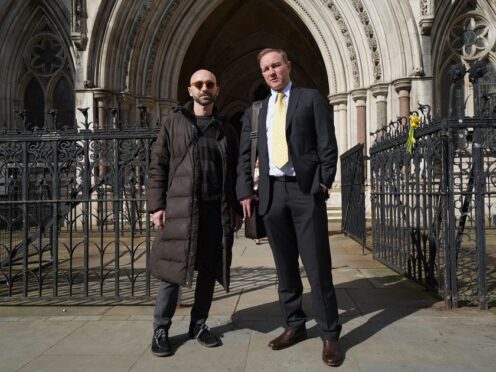Two former financial market traders convicted of interest rate benchmark manipulation have had bids to clear their names rejected by the Court of Appeal.
Tom Hayes, 44, a former Citigroup and UBS trader, was found guilty of multiple counts of conspiracy to defraud over manipulating the London Inter-Bank Offered Rate (Libor) between 2006 and 2010.
His case, alongside that of another similarly jailed trader, Carlo Palombo, 45, were referred to the court by the Criminal Cases Review Commission (CCRC), which investigates potential miscarriages of justice.
At a three-day hearing in London earlier this month, the men’s lawyers argued that their convictions were “unsafe” and should be quashed.
The Serious Fraud Office (SFO) opposed the appeals, arguing that they featured no new arguments to previous findings by the court.

In a ruling on Wednesday, Lord Justice Bean, who considered the cases with Lord Justice Popplewell and Mr Justice Bryan, dismissed both appeals.
Speaking outside the Royal Courts of Justice after the ruling, Hayes said the judges’ decision is “a shock” and that he will be making a bid to take his case to the Supreme Court.
He said his case is “not consistent” with laws in France, Germany and the US, adding: “We’re in a very, very sort of Alice in Wonderland situation here.”
He told reporters: “I’m used to losing… I’m a fighter not a quitter.”
The Libor rate was previously used as a reference point around the world for setting millions of pounds worth of financial deals, including car loans and mortgages.
It was an interest rate average calculated from figures submitted by a panel of leading banks in London, with each one reporting what it would be charged were it to borrow from other institutions.
Hayes, who has maintained his innocence, spent five-and-a-half years in prison and was released in January 2021.
At his 2015 trial, he was described by prosecutors as the “ringmaster” at the centre of an enormous fraud to boost his own six-figure earnings.

Palombo, an ex-vice president of euro rates at Barclays bank, was found guilty of conspiring with others to submit false or misleading Euro Interbank Offered Rate (Euribor) submissions between 2005 and 2009.
He had denied acted dishonestly but was jailed for four years in April 2019 after a retrial.
Both men had lost previous Court of Appeal challenges against their convictions.
Hayes’ lawyers previously said, in arguments backed by Palombo’s legal team, that the judge overseeing his trial was wrong to tell jurors there was a ban on commercial considerations during the Libor setting process.
They also argued that the judge’s directions to the jury had a “catastrophic” effect on his defence and made his trial “extraordinarily unfair”.
Judges were told they should follow the approach of a US appeals court in January 2022 which found there was no ban on taking into account commercial interests when making rate submissions.
The SFO said the Libor definition and Euribor code banned banks from considering financial interests when deciding on rates to submit, that jurors were not misdirected and that the US ruling was “irrelevant” to the fairness of Hayes’ trial.

Lord Justice Bean, reading a summary of judges’ ruling at a short hearing on Wednesday, said the Libor and Euribor codes “were binding contracts, resembling legislation”.
He said it is “well-established that the interpretation of commercial contracts or regulatory documents resembling legislation is an issue of law, for a judge to determine” and that the US ruling “did not therefore cast doubt on the correctness of the previous decisions of this court as a matter of English law”.
“Libor required the submission of what the individual bank ‘could’ borrow, which must mean the cheapest rate available to it, as this court had already confirmed in its previous decisions.
“Euribor similarly required the ‘best’, i.e. cheapest, rate at which cash could be borrowed or lent.
“A single figure, not a range of figures, had to be submitted. While the assessment was subjective and could legitimately vary between submitters and between banks, each submitter was still required to give their honest and genuine assessment.”
The judge said “asking a jury to decide on the meaning of such documents could result in inconsistent decisions”.
He said jurors were not misdirected in Hayes’ case, adding that there was “indisputable documentary evidence” which showed his seeking to move the Libor rate “was accompanied by attempts to maintain secrecy, as well as his frank admissions of dishonesty in the scoping interviews”.
“Both carried the clear implication that he knew what he was doing was not permitted by Libor.”
Lord Justice Bean said both men have 14 days to apply for permission to appeal to the Supreme Court.
An SFO spokesperson said: “The Court of Appeal’s judgment is clear that these convictions for fraud are still as relevant today as 10 years ago.
“No-one is above the law and the court has recognised that these convictions stand firm.”
According to the SFO, Hayes was one of 19 people prosecuted for trader manipulation and one of nine convicted – all of whom have since brought unsuccessful appeal bids.
